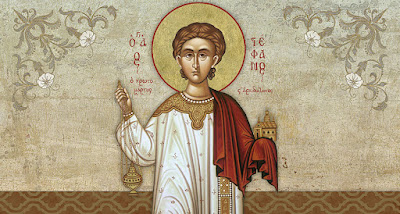Feast day of Agios Stefanos
On December 27 the Greek Orthodox Church celebrates the Feast Day of Agios Stefanos.
Saint Stephen was the first of the seven deacons whom the Apostles ordained to serve the Church in Jerusalem. Being filled with the grace of the Holy Spirit, he worked miracles and wonders among the people.
Disputing with the Jews concerning Jesus, St Stephen was falsely accused of blasphemy and was brought before the high priest’s council, Sanhendrin.
Gazing into Heaven and inspired by the spirit that Christ had promised to His disciples in such an event, the Saint said "Lord, I see the Heavens opened and the Son of man standing at the right hand of God." The inspired words filled the Saint's heart and made it heavenly, spreading over his body, and illumining his face with a divine light.
Unable to bear this revelation, the Jews blocked their ears and with anger, took St Stephen out of the city and stoned him, while he was calling out "Lord Jesus, receive my spirit."
Saint Stephen was the first to take the path to Heaven that Christ opened by His Passion, and the first to become a martyr. His voluntary death for the Truth opened Paradise to him and enabled him to see the glory of God.
Of the numerous speeches in Acts of the Apostles, Stephen's speech to the Sanhedrin is the longest. To the objection that it seems unlikely that such a long speech could be reproduced in the text of Acts exactly as it was delivered, some Biblical scholars have replied that Stephen's speech shows a distinctive personality behind it.
There are at least five places where Stephen's re-telling of the stories of Israelite history diverges from the scriptures where these stories originated; for instance, Stephen says that Jacob's tomb was in Shechem,[Acts 7:16] but Genesis 50:13[Genesis 50:13] says Jacob's body was carried and buried in a cave in Machpelah at Hebron.[Acts 8:1] Some theologians argue that these may not be discrepancies, but rather a condensing of historical events for people who were already familiar with them. That Jacob's body was carried to a final resting place in Shechem is not recorded in Genesis, though it does not exclude the possibility that his bones were transferred to Shechem for a final burial place, as was done with the bones of Jacob's son Joseph, as described in Joshua 24:32 Other scholars consider them as errors. Still others interpret them as deliberate choices making theological points. Another possibility is that the discrepancies come from an ancient Jewish tradition which was not included in the scriptures or may have been popular among people of Jerusalem who were not scribes.
Numerous parallels between the accounts of Stephen in Acts and the Jesus of the Gospels – they both perform miracles, they are both tried by the Sanhedrin, they both pray for forgiveness for their killers, for instance – have led to suspicions that the author of Acts has emphasised – in order to show the recipient that people become holy when they follow the example of Christ – or invented some (or all) of these.
The criticism of traditional Jewish belief and practice in Stephen's speech is very strong – when he says God does not live in a dwelling "made by human hands", referring to the Temple, he is using an expression often employed by Biblical texts to describe idols.
Some people have laid the charge of anti-Judaism against the speech, for instance the priest and scholar of comparative religion S. G. F. Brandon, who states: "The anti-Jewish polemic of this speech reflects the attitude of the author of Acts."
Today is also the Name day of Stefanos, Stefania, Mavrikos and Mavrikia.





Σχόλια